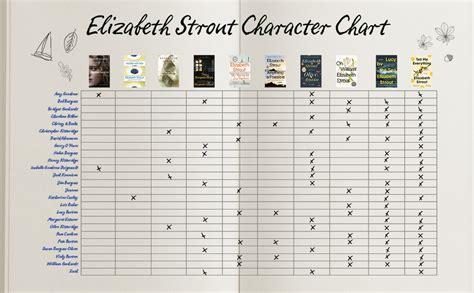The landscape of American literature is dotted with the works of Elizabeth Strout, a masterful storyteller known for her character-driven novels. With a unique ability to capture the essence of human experience, Strout’s writing not only resonates deeply with readers but also offers profound insights into the complexities of the human condition. This exploration delves into the heart of Strout’s novels, unpacking the character-driven insights that have cemented her place among the most revered authors of contemporary literature.
At the core of Strout’s narrative approach is her profound understanding of character development. Her novels are not merely plots woven together with intricate storylines; rather, they are deeply personal explorations of the human psyche. Characters in Strout’s works are multidimensional, with each one reflecting a piece of the human puzzle. They are flawed, relatable, and often caught in the midst of life’s challenging situations, making them universally accessible to readers from diverse backgrounds.
One of the hallmarks of Strout’s writing is her ability to convey the inner lives of her characters with stunning clarity. Through her characters’ experiences, she explores themes of loneliness, the search for meaning, the complexities of human relationships, and the struggles of everyday life. For instance, in “Olive Kitteridge,” the titular character’s life is a testament to the enduring power of love, forgiveness, and the human capacity to grow and change. Olive, with all her rough edges and deep insecurities, stands as a symbol of resilience and the complexity of human emotions.
Strout’s novels also delve into the concept of community and how individuals find their place within it. Her characters often navigate the delicate balance between personal independence and the need for connection, reflecting the broader societal themes of belonging and isolation. In “Amy and Isabelle,” the mother-daughter relationship serves as a backdrop to explore the intricate dynamics of family bonds, the challenge of expressing love and anger simultaneously, and the longing for understanding that often characterizes human relationships.
Moreover, Strout’s work is notable for its exploration of the American experience, particularly the lives of those in small-town America. Her descriptions of rural landscapes and the quiet, unassuming lives of her characters are not just backdrops but integral to the narrative, underscoring the idea that place and environment deeply influence who we are and how we live. In “My Name is Lucy Barton,” the protagonist’s journey from a poverty-stricken childhood in rural Illinois to her adulthood in New York City is a powerful exploration of identity, class, and the enduring impact of one’s origins on their sense of self.
The character-driven insights in Strout’s novels are also deeply rooted in her exploration of the human condition through the lens of memory and time. Her characters’ recollections and reflections serve as a tool to dissect the past, understand the present, and contemplate the future. This temporal exploration humanizes her characters, making them relatable and authentic. For example, in “The Burgess Boys,” the Burgess family’s struggles with identity, loyalty, and the repercussions of their actions are intertwined with their memories and the evolving nature of their relationships over time.
In addition to character development, Strout’s mastery of language plays a crucial role in imbuing her novels with depth and nuance. Her prose is simple yet powerful, with a subtlety that belies its emotional impact. Each sentence, each phrase, is carefully crafted to reveal character, advance the plot, and evoke a specific emotional response from the reader. This restraint and precision in her writing contribute to the intimacy and immediacy of her stories, drawing readers into the inner worlds of her characters.
Strout’s ability to craft characters that readers can both empathize with and sometimes disagree with is a testament to her writing’s enduring appeal. Her novels invite readers to reflect on their own lives, relationships, and choices, fostering a sense of connection that transcends the boundaries of fiction. This reflective quality, coupled with her insightful portrayals of human nature, has made her works a staple of contemporary American literature.
In conclusion, Elizabeth Strout’s novels offer a profound exploration of the human experience through their character-driven narratives. With a focus on the complexities, frailties, and strengths of her characters, Strout delves into themes that are both universally relatable and deeply personal. Her writing is a reminder of the power of storytelling to connect us, to challenge our perceptions, and to offer us a glimpse into the intricate tapestry of human life.
What makes Elizabeth Strout's novels character-driven?
+Elizabeth Strout's novels are considered character-driven because they focus deeply on the inner lives, emotions, and relationships of the characters. The plots are often secondary to the exploration of human psychology and the complexities of character development.
How does Strout's use of language contribute to the emotional impact of her novels?
+Strout's mastery of language, characterized by simplicity, precision, and subtlety, plays a significant role in the emotional impact of her novels. Her writing style evokes a sense of intimacy and immediacy, drawing readers into the characters' inner worlds and fostering a deep emotional connection.
What themes are commonly explored in Strout's novels?
+Elizabeth Strout's novels often explore themes of loneliness, human relationships, the search for meaning, and the complexities of everyday life. Her works also delve into the concept of community, the impact of memories on our understanding of ourselves, and the multifaceted nature of human emotions.



